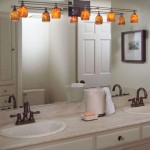Essential Aspects of Bathroom Sink Material
Bathroom sink material plays a crucial role in determining the overall aesthetic, durability, and functionality of your bathroom. Understanding the essential aspects of different materials can help you make an informed decision that aligns with your specific needs and preferences. This article explores the key considerations to keep in mind when choosing bathroom sink material. ### Durability The durability of a bathroom sink material is paramount as it influences the sink's ability to withstand everyday use and wear. Materials such as ceramic, porcelain, and vitreous china are highly durable and resistant to scratches, chips, and stains. These materials can maintain their original appearance for many years, even with regular use. ### Resistance to Staining and Discoloration Bathrooms are prone to exposure to moisture, soap, and cleaning agents, which can potentially stain or discolor the sink. Materials like stainless steel and composite resin are highly resistant to staining and discoloration. They maintain their original color and appearance, even after prolonged exposure to various substances. ### Ease of Cleaning and Maintenance Bathroom sinks should be easy to clean and maintain to ensure hygiene and prevent the spread of bacteria. Materials such as acrylic and quartz are non-porous and resist the growth of mold and mildew. They can be easily cleaned with regular household cleaners and require minimal maintenance. ### Style and Aesthetics The material of your bathroom sink can significantly impact the overall style and aesthetics of your bathroom. Ceramic, porcelain, and natural stone materials like marble or granite offer a classic and elegant look. Stainless steel and composite resin provide a more modern and contemporary aesthetic. Choose a material that complements the design and décor of your bathroom. ### Compatibility with Bathroom Fixtures The material of your bathroom sink should be compatible with other bathroom fixtures, such as faucets, drains, and countertops. Ceramic, porcelain, and vitreous china sinks are compatible with a wide range of fixtures and can be matched with various faucet styles. Stainless steel and composite resin sinks may have specific compatibility requirements that you need to consider. ### Cost The cost of bathroom sink material varies depending on the type of material and its quality. Ceramic and porcelain are generally more affordable than natural stone or composite resin. Stainless steel is a cost-effective option that provides durability and a modern look. When considering the cost, factor in the installation costs and the potential for repairs or replacements in the future. ### Conclusion Choosing the right bathroom sink material requires careful consideration of durability, resistance to staining, ease of cleaning, style, compatibility, and cost. By understanding the essential aspects of different materials, you can make an informed decision that meets your specific needs and enhances the functionality and aesthetics of your bathroom.
The Most Common Sinks Materials Pros And Cons Before You Purchase In 2024 Badeloft
Bathroom Sink Material Guide Signature Hardware
Bathroom Sink Material Guide Signature Hardware

Sink Types Material Kitchen Bathroom Imagine Stoneworks

Types Of Bathroom Sinks The Home Depot
Bathroom Sink Material Guide Signature Hardware

Bathroom Sink 101
Bathroom Sink Material Guide Signature Hardware

Types Of Materials For Your Bathroom Basin
Bathroom Sink Material Guide Signature Hardware
Related Posts







